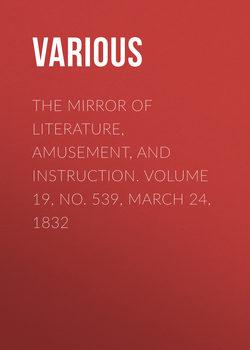Читать книгу The Mirror of Literature, Amusement, and Instruction. Volume 19, No. 539, March 24, 1832 - Various - Страница 3
NOTES OF A READER
ОглавлениеDOMESTIC LIFE IN AMERICA
Servants.
The following sketch of what the Americans feel on this point, from Mrs. Trollope's Domestic Manners of the Americans, is clever and amusing:—
"The greatest difficulty in organizing a family establishment in Ohio is getting servants, or, as it is there called, 'getting help,' for it is more than petty treason to the republic to call a free citizen a servant. The whole class of young women, whose bread depends upon their labour, are taught to believe that the most abject poverty is preferable to domestic service. Hundreds of half-naked girls work in the paper-mills, or in any other manufactory, for less than half the wages they would receive in service: but they think their equality is compromised by the latter, and nothing but the wish to obtain some particular article of finery will ever induce them to submit to it. A kind friend, however, exerted herself so effectually for me, that a tall stately lass soon presented herself, saying, 'I be come to help you.' The intelligence was very agreeable, and I welcomed her in the most gracious manner possible, and asked what I should give her by the year. 'Oh Gimini!' exclaimed the damsel, with a loud laugh, 'you be a downright Englisher, sure enough. I should like to see a young lady engage by the year in America! I hope I shall get a husband before many months, or I expect I shall be an outright old maid, for I be most seventeen already; besides, mayhap I may want to go to school. You must just give me a dollar and a half a week; and mother's slave, Phillis, must come over once a week, I expect, from t'other side the water, to help me clean.' I agreed to the bargain, of course, with all dutiful submission; and seeing she was preparing to set to work in a yellow dress parsemé with red roses, I gently hinted, that I thought it was a pity to spoil so fine a gown, and that she had better change it. ''Tis just my best and worst,' she answered, 'for I've got no other.' And in truth I found that this young lady had left the paternal mansion with no more clothes of any kind than what she had on. I immediately gave her money to purchase what was necessary for cleanliness and decency, and set to work with my daughters to make her a gown. She grinned applause when our labour was completed, but never uttered the slightest expression of gratitude for that or for anything else we could do for her. She was constantly asking us to lend her different articles of dress, and when we declined it, she said, 'Well, I never seed such grumpy folks as you be; there is several young ladies of my acquaintance what goes to live out now and then with the old women about the town, and they and their gurls always lends them what they asks for; I guess, you Inglish thinks we should poison your things, just as bad as if we was negurs.' And here I beg to assure the reader, that whenever I give conversations, they were not made à loisir, but were written down immediately after they occurred, with all the verbal fidelity my memory permitted."
"This young lady left me at the end of two months, because I refused to lend her money enough to buy a silk dress to go to a ball, saying, 'Then it is not worth my while to stay any longer.' I cannot imagine it possible that such a state of things can be desirable or beneficial to any of the parties concerned. I might occupy a hundred pages on the subject, and yet fail to give an adequate idea of the sore, angry, ever-wakeful pride that seemed to torment these poor wretches. In many of them it was so excessive, that all feeling of displeasure, or even of ridicule, was lost in pity. One of these was a pretty girl, whose natural disposition must have been gentle and kind; but her good feelings were soured, and her gentleness turned into morbid sensitiveness, by having heard a thousand and a thousand times that she was as good as any other lady, that all men were equal, and women too, and that it was a sin and a shame for a free-born American to be treated like a servant. When she found she was to dine in the kitchen, she turned up her pretty lip, and said, 'I guess that's 'cause you don't think I'm good enough to eat with you. You'll find that won't do here.' I found afterwards that she rarely ate any dinner at all, and generally passed the time in tears. I did everything in my power to conciliate and make her happy, but I am sure she hated me. I gave her very high wages, and she stayed till she had obtained several expensive articles of dress, and then, un beau matin
